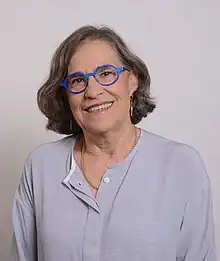Daniella Goldfarb | |
|---|---|
 | |
| Born | |
| Alma mater | Hebrew University of Jerusalem University of Rhode Island Weizmann Institute of Science |
| Scientific career | |
| Institutions | Weizmann Institute of Science |
| Thesis | Magnetic resonance study of liquid crystalline phases (1984) |
| Website | Goldfarb Lab |
Daniella Goldfarb is an Israeli chemist who is the Erich Klieger Professorial Chair in Chemical Physics at the Weizmann Institute of Science. She is the President’s Advisor for Advancing Women in Science. Her research makes use of electron paramagnetic resonance spectroscopy. She was awarded the 2016 Israel Chemical Society Excellence prize.
Early life and education
Goldfarb was born in Paris.[1] She was an undergraduate student at the Hebrew University of Jerusalem, where she majored in chemistry.[2] She moved to the United States for her graduate studies, and earned a Master's degree at the University of Rhode Island in 1978.[3] After completing her graduate degree, she joined the laboratory of Zeev Luz at the Weizmann Institute of Science.[3] Her doctoral research made use of magnetic resonance imaging to study liquid crystalline phases.[4] She was a postdoctoral scholar at the University of Houston.[2]
Research and career
In 1987, Goldfarb returned to the Weizmann Institute of Science, where she was made a scientist in the Department of Isotope Research. She was promoted to Professor in 1998.[5][3] Her research considers electron paramagnetic resonance spectroscopy.[6] She has contributed to the understanding of protein structure and how proteins respond to drugs.[1]
In 2014, Goldfarb was appointed the Weizmann Institute of Science President’s Advisor for Advancing Women in Science.[1]
Awards and honours
- 2007 Royal Society of Chemistry Bruker Prize[7]
- 2009 International Zavoisky Award[8]
- 2011 Technion – Israel Institute of Technology Kolthoff Prize
- 2013 Elected Fellow of the Royal Society of Chemistry[5]
- 2015 Elected President of the International Society of Magnetic Resonance
- 2016 Israel Chemical Society Excellence prize[9]
- 2017 International EPR Society Silver Medal[10]
- 2019 Ernst Prize [11]
- 2020 Elected Fellow of the International EPR Society[12]
Selected publications
- Francois-Xavier Theillet; Andres Binolfi; Beata Bekei; et al. (25 January 2016). "Structural disorder of monomeric α-synuclein persists in mammalian cells". Nature. 530 (7588): 45–50. doi:10.1038/NATURE16531. ISSN 1476-4687. PMID 26808899. Wikidata Q38799574.
- Goldfarb, D.; Bernardo, M.; Strohmaier, K. G.; Vaughan, D. E. W.; Thomann, H. (1994). "Characterization of Iron in Zeolites by X-band and Q-Band ESR, Pulsed ESR, and UV-Visible Spectroscopies". Journal of the American Chemical Society. 116 (14): 6344–6353. doi:10.1021/ja00093a039. ISSN 0002-7863.
- ZHAO, D.; GOLDFARB, D. (2010-08-17). "ChemInform Abstract: Synthesis of Mesoporous Manganosilicates: Mn-MCM-41, Mn-MCM-48 and Mn- MCM-L". ChemInform. 26 (36): no. doi:10.1002/chin.199536022. ISSN 0931-7597.
Books
- Goldfarb, Daniella (2018). Modern EPR Spectroscopy. Stefan Stoll. Newark: John Wiley & Sons, Incorporated. ISBN 978-1-119-16298-8. OCLC 1028941665.
Personal life
Goldfarb is married with two daughters.[1]
References
- 1 2 3 4 "Prof. Daniella Goldfarb | International Board 2017". www.weizmann.ac.il. Retrieved 2021-06-17.
- 1 2 "BULLETIN DU GROUPEMENT" (PDF). Archived (PDF) from the original on 2019-07-25.
- 1 2 3 "ICE | The Israel Chemist and Engineer". ice.digitaler.co.il. Retrieved 2021-06-17.
- ↑ Goldfarb, Daniella (1984). Magnetic resonance study of liquid crystalline phases. Rehovot: publisher not identified. OCLC 884945464.
- 1 2 "Prof. Daniella Goldfarb - AcademiaNet". www.academia-net.org. Retrieved 2021-06-17.
- ↑ SelectScience. "Professor Daniella Goldfarb". www.thescientistschannel.com. Retrieved 2021-06-17.
- ↑ "Bruker Lectures – RSC ESR Group". Retrieved 2021-06-17.
- ↑ "The International Zavoisky Award 2009". kfti.knc.ru. Retrieved 2021-06-17.
- ↑ "Outstanding Scientist". ics-website. Retrieved 2021-06-17.
- ↑ "IES Gold and Silver Medals". Archived from the original on 2020-02-22.
- ↑ "Weizmann Wonder".
- ↑ "IEPS Fellows". IEPS. Archived from the original on 2020-02-22.